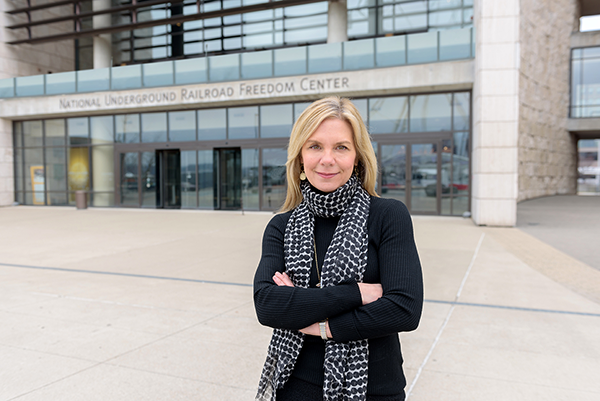Leadership Cincinnati Class of 43 Call to Action – The Time is Now
Ellen M. Katz – September 4, 2019
Class of 43 – Welcome to the club. You have arrived! It’s a privilege to be here but comes with the responsibility to be an agent in strengthening our region. And… our greatest potential may not be where you think.
In this program, you will meet amazing people while learning about every sector of our civic life. While you are soaking it in, keep in mind, an investment was made in you knowing that your organization’s success depends on this community – and the community’s success depends on your organization. The two are inextricably linked.
Some things are easy to see in our community: We’ve got festivals, parks, beer, bourbon, arts, urban development, vibrant neighborhoods – all so good.
Here is what is not so easily seen: We are a top ten city nationally for childhood poverty, segregation, and lack of upward mobility. This means that if you are born in poverty here, you’re not likely to get out. Other cities have better paths to economic prosperity. Unfortunately, our systems hold people back.
And sadly, these unwanted outcomes occur disproportionately here for African Americans. This is so wrong and presents a huge problem for the future of our region. Consider this: In six months, the majority of kids under the age of 18 will be kids of color. And in two decades, our entire region will be.
So what is holding back the incredible potential of the proud, united, soulful, inherently talented African Americans of our region? Poverty? No. That’s a symptom. The answer is systemic racism – a phenomenon of our nation’s history that deserves and requires our attention here at home.
We often point to individuals who have overcome the system’s grip to prove that it is possible. You’ve seen them on brochures. Or some profess that if people just make the right choices, they’ll have the same opportunity to succeed. But do they?
You’ve all played Monopoly. Pass go, collect $200, buy property, collect cash. Now imagine eight of your friends decide to get together for Monopoly night. Five arrive on time, three are running late. The five decide to get started, figuring the other three can join later. After all, Monopoly can go all night.
Now let’s think this through. What’s it like for those who join the game late? Start behind, and every turn presents a risk to fall further in a hole. Nothing about the game can help you catch up. Perhaps a Community Chest card will provide a minor leg up. But regardless, the friends who arrived late really have no chance in the game to enjoy the power and control held by the early players.
Sure, it happens – albeit rarely – that someone comes from behind and wins. But it’s the exception, not the rule. And this player just might end up on Monopoly’s brochure with a caption indicating, see…. it IS possible.
Class 43, we need a more equitable game. Where all people – regardless of race – have a fair and just opportunity to participate, prosper and reach their full potential. This is the definition of racial equity.
The morality of this issue alone should be enough to compel us to act, but I can also make the case for collective gain… that all boats will rise higher, including those riding high today.
Maybe you question how advancing people held back can provide a benefit to everyone. I shared an example with last year’s class. Think about the investment we’ve made to ensure that every sidewalk crossing in the nation has a curb cut, built expressly for disabled people with mobility issues. But does everyone benefit from curb cuts? Every skateboarding, scooter riding, baby strolling, suitcase-toting person is better off as a result.
Racial equity is a challenge, even daunting, but the possibilities are enormous. Through research conducted here, we know that our region’s GDP would be $9.9B greater PER YEAR if we could close the racial gap in income.
Throughout this program, will you please look for — actually seek out — this deeper view of our community through an equity lens? Ask your presenters how they are addressing the issue of race. When data is presented to you, ask that it be disaggregated by race. As you go through your day-to-day, look around. Take note of who you see. And who you do not see.
Let’s open our community’s eyes to everything that is true about who we are. Embrace what’s awesome – AND what is not. Finds ways to amplify the power of our regional assets while also tackling our liabilities.
And let me lay out this challenge to you too. When you are done with this program, some higher up at work is bound to ask you — should ask you — how did it go?
At that moment, I hope you will have the courage and determination to talk about your experience with your equity lens on. Leverage that important moment into an opportunity to point out what your organization itself needs to see, to know, to be doing differently. They may be doing a lot now, but we have yet to marshal the full resources and commitment on this urgent issue, and we need every shoulder to the wheel.
Leadership Cincinnati Class of 43 – Blast out of here with conviction – Now is the Time.

